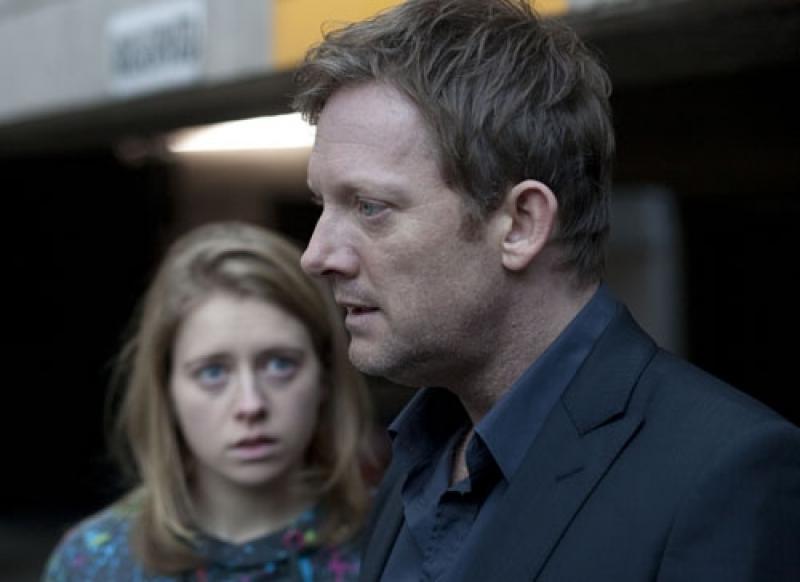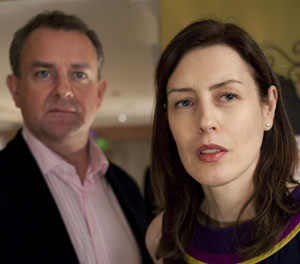The Silence, BBC One | reviews, news & interviews
The Silence, BBC One
The Silence, BBC One
Detectives-and-deafness drama defies critics and builds up impressive head of steam

There was a gnawing suspicion that The Silence wouldn’t amount to much, since it was dumped in a four-night splurge in the middle of the mid-summer doldrums, and even the normally docile Radio Times had decided to stamp its foot and pick holes in it. One’s apprehension proved ill-founded, however. It turned out to be taut, tense, well acted and smartly written, and carried enough pace to lift it over the more credulity-stretching passages.
Australian screenwriter Fiona Seres had set the bar pretty high for herself. On the one hand, The Silence was a drama about an extended family, with the theme of wife Anne (Gina McKee), husband Chris (Hugh Bonneville) and their deaf daughter Amelia (Genevieve Barr) pushed front and centre. On the other, it tracked the course of a double murder investigation headed by DCI Jim Edwards (played with sustained intensity by Douglas Henshall).

Add comment
The future of Arts Journalism
You can stop theartsdesk.com closing!
We urgently need financing to survive. Our fundraising drive has thus far raised £49,000 but we need to reach £100,000 or we will be forced to close. Please contribute here: https://gofund.me/c3f6033d
And if you can forward this information to anyone who might assist, we’d be grateful.

Subscribe to theartsdesk.com
Thank you for continuing to read our work on theartsdesk.com. For unlimited access to every article in its entirety, including our archive of more than 15,000 pieces, we're asking for £5 per month or £40 per year. We feel it's a very good deal, and hope you do too.
To take a subscription now simply click here.
And if you're looking for that extra gift for a friend or family member, why not treat them to a theartsdesk.com gift subscription?
more TV
 Murder Before Evensong, Acorn TV review - death comes to the picturesque village of Champton
The Rev Richard Coles's sleuthing cleric hits the screen
Murder Before Evensong, Acorn TV review - death comes to the picturesque village of Champton
The Rev Richard Coles's sleuthing cleric hits the screen
 Black Rabbit, Netflix review - grime and punishment in New York City
Jude Law and Jason Bateman tread the thin line between love and hate
Black Rabbit, Netflix review - grime and punishment in New York City
Jude Law and Jason Bateman tread the thin line between love and hate
 The Hack, ITV review - plodding anatomy of twin UK scandals
Jack Thorne's skill can't disguise the bagginess of his double-headed material
The Hack, ITV review - plodding anatomy of twin UK scandals
Jack Thorne's skill can't disguise the bagginess of his double-headed material
 Slow Horses, Series 5, Apple TV+ review - terror, trauma and impeccable comic timing
Jackson Lamb's band of MI5 misfits continues to fascinate and amuse
Slow Horses, Series 5, Apple TV+ review - terror, trauma and impeccable comic timing
Jackson Lamb's band of MI5 misfits continues to fascinate and amuse
 Coldwater, ITV1 review - horror and black comedy in the Highlands
Superb cast lights up David Ireland's cunning thriller
Coldwater, ITV1 review - horror and black comedy in the Highlands
Superb cast lights up David Ireland's cunning thriller
 Blu-ray: The Sweeney - Series One
Influential and entertaining 1970s police drama, handsomely restored
Blu-ray: The Sweeney - Series One
Influential and entertaining 1970s police drama, handsomely restored
 I Fought the Law, ITVX review - how an 800-year-old law was challenged and changed
Sheridan Smith's raw performance dominates ITV's new docudrama about injustice
I Fought the Law, ITVX review - how an 800-year-old law was challenged and changed
Sheridan Smith's raw performance dominates ITV's new docudrama about injustice
 The Paper, Sky Max review - a spinoff of the US Office worth waiting 20 years for
Perfectly judged recycling of the original's key elements, with a star turn at its heart
The Paper, Sky Max review - a spinoff of the US Office worth waiting 20 years for
Perfectly judged recycling of the original's key elements, with a star turn at its heart
 The Guest, BBC One review - be careful what you wish for
A terrific Eve Myles stars in addictive Welsh mystery
The Guest, BBC One review - be careful what you wish for
A terrific Eve Myles stars in addictive Welsh mystery
 theartsdesk Q&A: Suranne Jones on 'Hostage', power pants and politics
The star and producer talks about taking on the role of Prime Minister, wearing high heels and living in the public eye
theartsdesk Q&A: Suranne Jones on 'Hostage', power pants and politics
The star and producer talks about taking on the role of Prime Minister, wearing high heels and living in the public eye
 King & Conqueror, BBC One review - not many kicks in 1066
Turgid medieval drama leaves viewers in the dark
King & Conqueror, BBC One review - not many kicks in 1066
Turgid medieval drama leaves viewers in the dark
 Hostage, Netflix review - entente not-too-cordiale
Suranne Jones and Julie Delpy cross swords in confused political drama
Hostage, Netflix review - entente not-too-cordiale
Suranne Jones and Julie Delpy cross swords in confused political drama

Comments
...
...
People should be warned not
People should be warned not to watch this show. I thought it was excellent. But they wasted so much time in the fourth episode when they could have actually ended it! So frustrating. All the loose ends. Does Tom go to jail? Do the bad guys get away with murder? SIGH!
...
...
“I’ll bet this was written by
...
...
...
...
...
...
...
...
...
...
...
...
...
...
Totally agree. Just watched
...
The blow job was unnecessary
I do not understand all the
Right as I was riveted, the
The silence is a great short
I love Doug Henshall so was
I love Doug Henshall so was really looking forward to this. No-one does intense/horrified/fury like him. The first 3 episodes exactly as I expected. Then the last? What the hell happened? The writers left us hanging. He's found, a suspected suicide, Amelia's found, still the critical witness & the boxing cop may or may not have played the fight. Meanwhile the bent cops are running amok, & the poor guys in Bristol who had no idea who Amelia was, but we're trying to protect her, are left hanging? Worst ending ever. Can hardly believe the producers allowed this to happen.